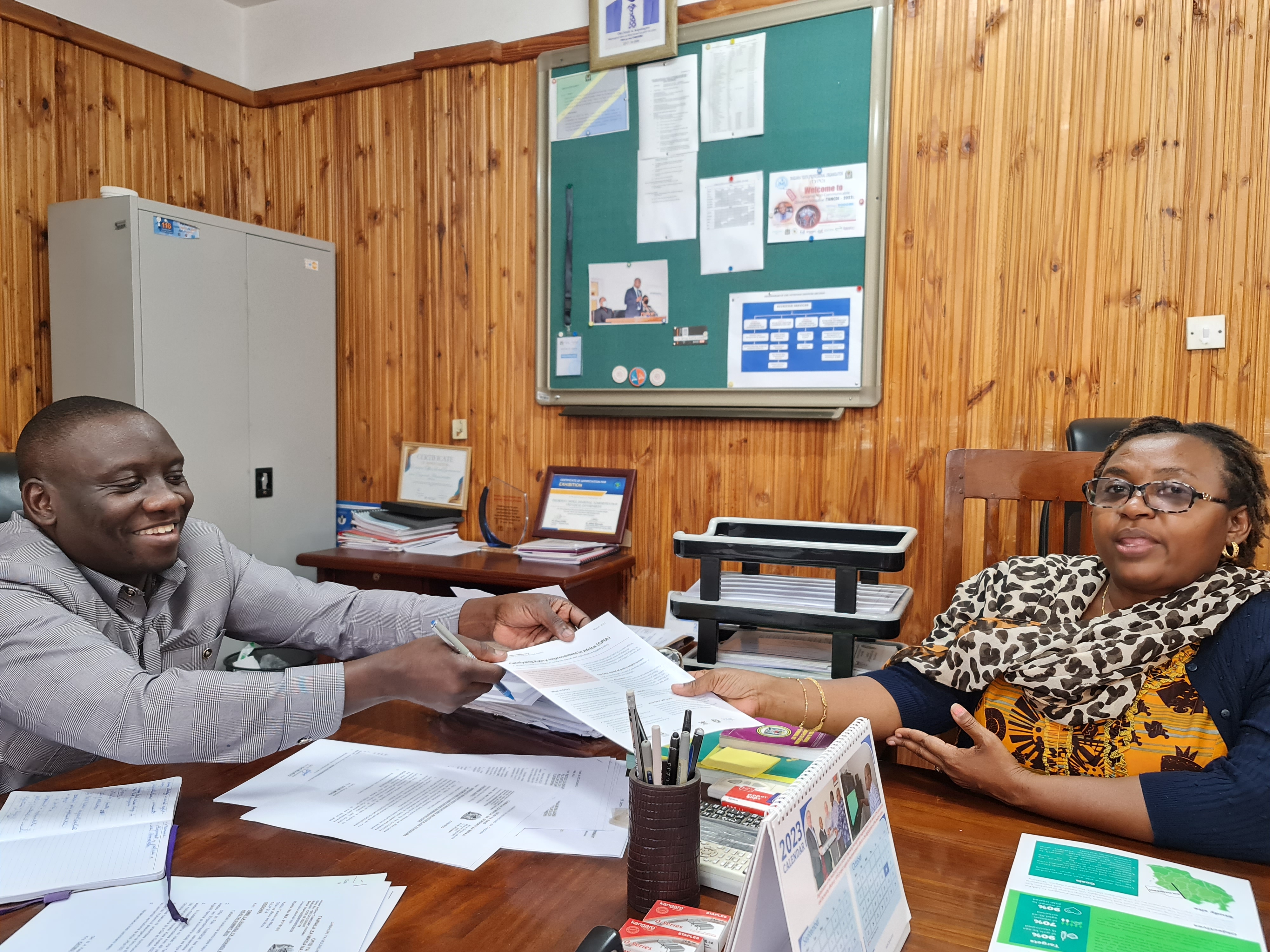
POLICY: High-level engagements with ministry officials in Dodoma

Ifakara Health Institute today, concludes three days (September 27-29, 2023) of high-level engagements with officials of the Health Portfolio in the President’s Office – Regional Administration and Local Governments (PO-RALG) in Dodoma.
Seasoned Senior Social Scientist, Dr. Sally Mtenga, led a team of three – with him also Drs. Getrud Mollel and Peter Binyaruka – at a number of engagements with key officials in the Health Portfolio within the PO-RALG.
The team held meetings with Dr. Ntuli Kapologwe – the Director of Services in-charge of the Health Portfolio; Dr. Bakari Salum – the Health Basket Fund Coordinator; and Dr. Yahaya Hussein – Head of the Child, Reproductive and Maternal Health.
The team introduced two projects – the first on policy improvement and the second on cervical cancer elimination – and also shared updates on implementation of the former for the purpose of getting feedback.
Project on policy improvement
Dr. Sally briefly introduced the Catalyzing Policy Improvement in Africa (CPIA) project in Tanzania which seeks to understand the current policy and research landscape in Tanzania in relation to the adolescent, sexual and reproductive health (ASRH).
She also shared feedback of the systematic review and provided the ministry officials with a summary of the CPIA project.
In his reaction, Dr. Kapologwe expressed interest in understanding policy issues. “This is a crucial area within the public health field… It’s true that the ASRH has multiple policies that are not aligned and not all the strategic objectives are being implemented as stipulated in the policy documents,” he said, underling funding as one of the impediments to ASRH policy implementation.
In August this year, the CPIA Tanzania project team conducted a multi-stakeholder meeting in Morogoro during which the team shared findings of a systematic review which sought to understand the current policy and research landscape in Tanzania in relation to the ASRH.
The multi-stakeholders included adolescents’ groups and members of the regional and district health management teams in Morogoro; the Morogoro Regional Medical Office; the Ministry of Health; President’s Office – Regional Administration and Local Governments; academic and research institutions; and development partners.
>> CPIA Tanzania project shares findings with multi-stakeholders in Morogoro, Tanzania.
About CPIA project
The project is simultaneously implemented in six African countries, including Tanzania. Other countries are: Senegal, Burkina Faso, Tanzania, Uganda and Mozambique. It aims to improve
policy and help bridge the research-policy gap; and strengthen local capacity.
The project’s funding model encourages external funding and support that is de-colonial by strengthening national leadership and decision-making; alignment and harmonization; and strengthening local research and policy-making systems and institutions.
The CPIA project duration is one and half years is funded by the IDRC from Canada.
>> Learn more about CPIA Tanzania project here.
Project on cervical cancer
Dr. Sally used the opportunity to introduce another project known as SPIRIT whose study title is: Towards the Elimination of Cervical Cancer in Tanzania: Participatory Research for Tailored Implementation Strategies. This project seeks to come up with evidence that will contribute to cervical cancer elimination in Tanzania.
Cervical cancer (CC) is one of the most preventable and treatable forms of cancer if detected and treated early. The World Health Organization (WHO) has called for the elimination of CC by the end of this century and set three intermediate targets: to vaccinate 90% of girls by age 15 against high-risk variants of Human Papilloma Virus (HPV), to screen 70% of women aged 35-49 years and to treat 90% of women with pre-cancer and cancer by 2030.
As it will take decades until HPV vaccinations effectively reduce CC incidence and mortality, screening for and treatment of cervical pre-cancer remains paramount. In Tanzania, screening rates are estimated to be only 11%.
This SPIRIT project brings together social scientists, clinicians and epidemiologists to address the first delay of CC screening uptake, construct and analyse a Cervical Cancer Prevention and Care Cascade to ensure the continuum of care, and investigate the health and psychosocial needs of women requiring treatment for CC in Kilombero District, Morogoro Region, Tanzania.
The project’s specific objectives are: to identify demand side gaps and opportunities for increasing Cervical Cancer Screening uptake; document and evaluate the Cervical Cancer Prevention and Care Cascade in women living with and without HIV in Tanzania; address treatment delays to ensure the continuum of care for CC using transdisciplinary research; and, synthesize the findings of our research to develop an evidence-based policy and coherent implementation strategies using transdisciplinary methods.
The SPIRIT project is implemented for 36 months from September 1st 2022.
>> Learn more about the SPIRIT project here.
